Deep dive: Vaccination trends among Discovery Health administered medical scheme members

From 17 May (the start of South Africa's mass vaccination campaign) to 9 August 2022, daily rates of vaccinations administered across age groups within Discovery Health's administered medical scheme member base have declined.
Authors
Shirley Collie (Chief Healthcare Analytics Actuary, Discovery Health), Lizelle Steenkamp (Senior Healthcare Statistician, Discovery Health) and Tinei Mangwiro (Analyst, Discovery Health)
- By 9 August 2022:
- Just under three quarters (73.4%) of all adult scheme members (over the age of 18) had been either partially or fully vaccinated for COVID-19.
- Just over 30% (32.4%) of all adolescents (between the ages of 12 and 17) had been either partially or fully vaccinated for COVID-19.
- Just over a quarter (27.7%) of all adult scheme members had either received at least a single COVID-19 booster.
- It took 168 days for 50% of adult members to be partially or fully vaccinated against COVID-19, but it took a further 350 days to reach the current vaccination rate of 73.4% amongst adult members.
Are vaccination rates plateauing or declining across each age group?
(a) Proportion of members vaccinated, by age group
Figure 1 shows the proportion of scheme members vaccinated by 9 August 2022 across age groups. It also shows the plateau in vaccination rates in each age band since 17 May 2021 (the start of South Africa's mass vaccination campaign).
- People vaccinated for COVID-19 before 17 May 2021 were vaccinated under the Sisonke COVID-19 trial. The trial focused on healthcare workers and certain staff members within the healthcare sector. This trial was not open to the public at large. This cohort received the single-dose Johnson & Johnson COVID-19 vaccine.
By 9 August, 83.6% of Discovery Health clients aged 60 years and older had been either partially or fully vaccinated. This age group has been eligible for vaccination since 17 May 2021, the start of South Africa's mass vaccination campaign.
By 9 August 2022 (ten months after they became eligible for vaccination), 63.2% of scheme members aged 18 to 34 had had a COVID-19 vaccine dose. On 9 August 2022, the 7-day average daily vaccination rate was at 59 doses, down from the 7-day average daily vaccination rate of 17,260 doses seen since 26 August 2021 (when this group eligibility opened).
There has been a much slower take up on vaccines for adolescents aged between 12 to 17 with only 32.4% of children in this age group vaccinated as at 9 August (9 months after they became eligible for vaccination).
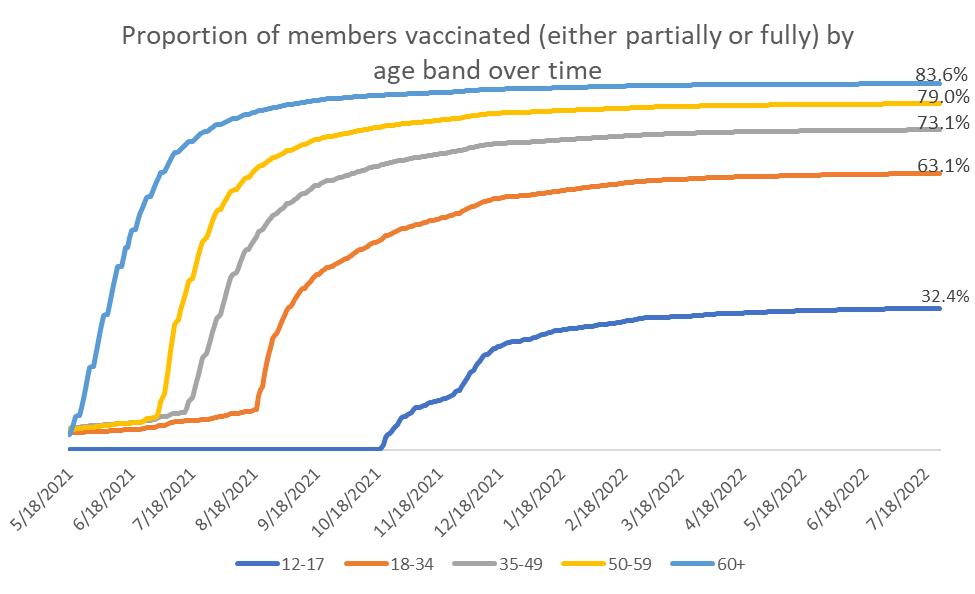
Figure 1: Proportion of members vaccinated by age group
As of 9 August 2022, just under 40% of members over the age of 60 had received at least a single COVID-19 booster, up from 3.5% at the turn of the year.
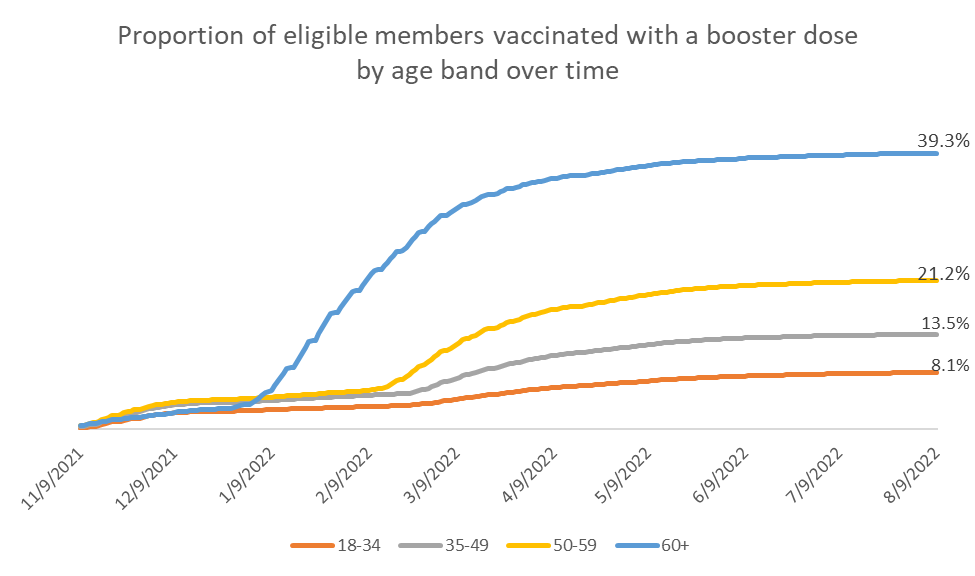
Figure 2 : Proportion of members vaccinated with a booster dose by age group
Figure 3 shows, a significant increase in the proportion of members vaccinated in the first 120 days after the opening of vaccine eligibility of the respective age bands and has remained relatively flat since then.
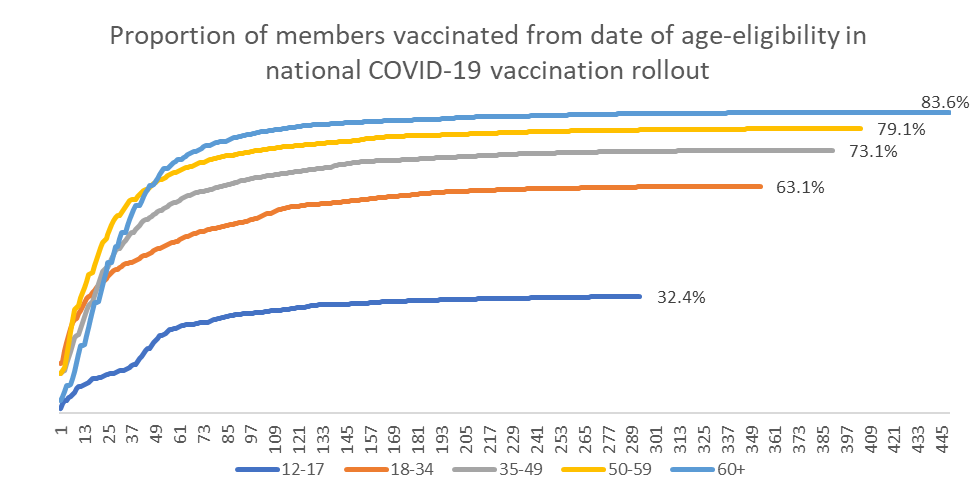
Figure 3 : Proportion of members vaccinated from date of age based eligibility criteria
(b) 7-day daily average of COVID-19 vaccines administered across age groups
Figure 4 reflects the 7-day daily average of COVID-19 vaccines given to scheme members between 17 May 2021 and 9 August 2022.
The data shows:
- A decline in the number of daily vaccinations administered to scheme members aged 60 and over - from a high of 10 178 daily vaccinations recorded between 15 and 21 July 2021, to 160 daily vaccine doses for the week ending 9 August 2022.
- Vaccinations opened to this age group from 17 May 2021, accounting for the rise in vaccinations at that time and through to the end of July 2021.
- Two peaks in daily vaccination rates for scheme members aged 50 to 59:
- The first between 3 and 9 July 2021 with 11 575 daily vaccinations administered
- The second between 15 and 21 August 2021 with 10 660 daily vaccinations administered
- Registrations for COVID-19 vaccination opened to this age group from 1 July 2021.
- For scheme members aged 35 to 49, a decline from 14 071 vaccinations administered daily in the week ending 24 July 2021, to 47 vaccinations administered daily by the week ending 9 August 2022.
- Registrations opened to this age group from 15 July 2021.
- In scheme members aged 18 to 34, the number of daily vaccinations administered reached a peak of 17 260 for the week ending 26 August and has since seen a sharp decline to 59 daily vaccinations for the week ending 9 August 2022.
- Registrations opened to this age group from 20 August 2021.
- In scheme members aged 12 to 17, the number of daily vaccinations administered reached a peak of 2 433 for the week ending 26 October and has since seen a sharp decline to 22 daily vaccinations for the week ending 9 August 2022.
- This group was most recently eligible for vaccination with registration open from 20 October 2021.
The highest number of vaccinations administered on a single day, across all age bands, occurred on 20 August.
On this day, cumulatively 52 890 scheme members were vaccinated for COVID-19. This peak happened to coincide with the opening of vaccination eligibility to people aged 18 to 34 years on 20 August. Publicity in this regard may account for the high demand for vaccines on this day.
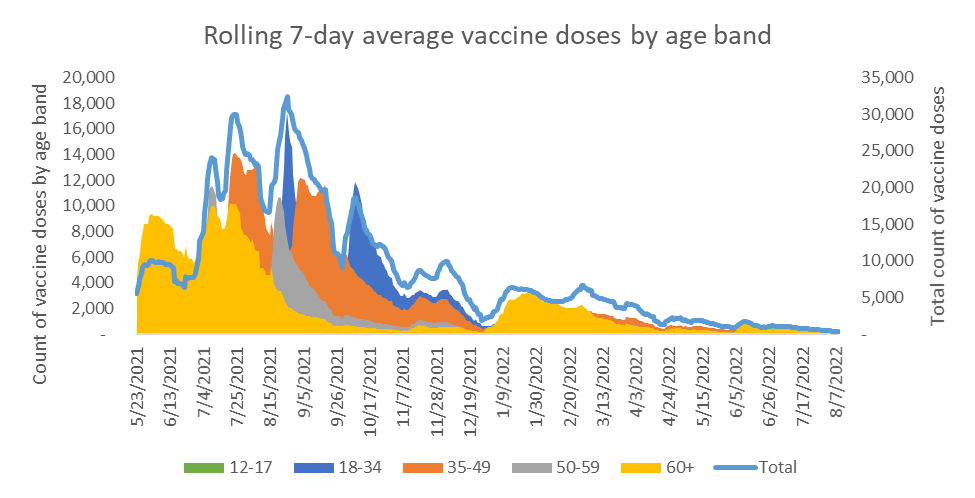
Figure 4 : Rolling 7-day average vaccine doses
Which clinical categories of members are likely to be vaccinated
(a) Is risk of serious COVID-19 illness a driver of vaccine uptake?
Figure 5 shows the way in which scheme members whose "COVID-19 personal resilience risk index" score is low are more likely to be vaccinated (across age categories). This suggests that members who perceive themselves as being at risk of severe COVID-19 related outcomes (admission to hospital), are likely to be slightly more motivated to be vaccinated for COVID-19.
Adult scheme members with a low COVID-19 personal resilience risk index score are between 0.5% to 24% more likely to be vaccinated than individuals with a high resilience score.
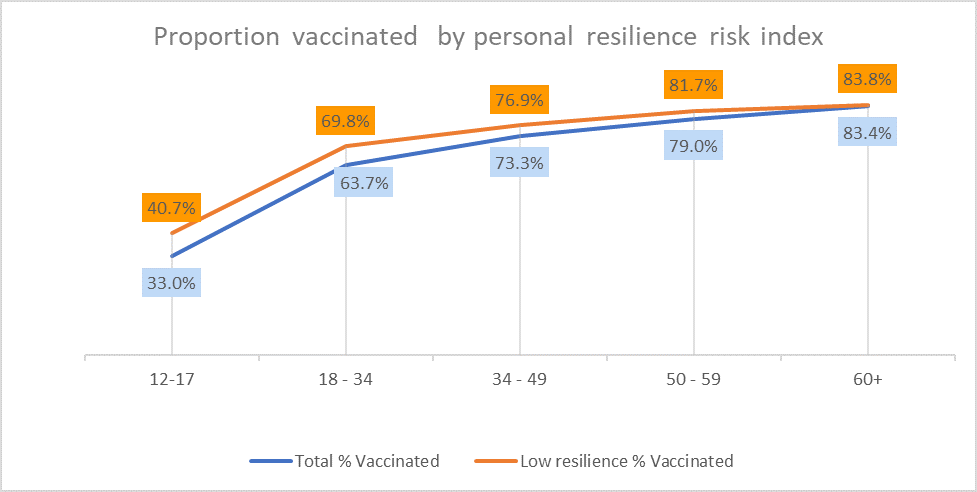
Individuals with low COVID-19 personal resilience risk index scores are 3% to 35% more likely to be vaccinated (booster) than people with high resilience scores.
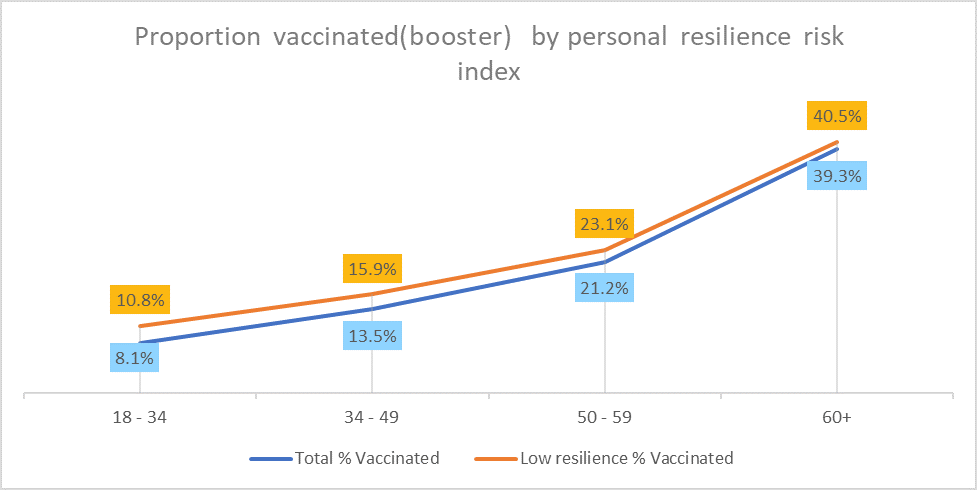
Figure 6 : Proportion vaccinated (Booster) by resilience index category
(b) Recovery from COVID-19 illness - a deterrent of vaccine uptake?
Figure 7 shows how many scheme members have had a documented, prior COVID-19 infection since the start of the pandemic. It distinguishes between unvaccinated, vaccinated and booster-vaccinated scheme members, by age category.
The analysis shows that: 13.9% of currently unvaccinated scheme members are people who have a prior documented COVID-19 infection.
In contrast, 13.2% of vaccinated members have had documented COVID-19 infection. 9.2% of members vaccinated (booster) have had prior documented COVID-19 infection. This difference is greater in older age bands, and we see little to a slight increased likelihood of individuals with prior documented infection below age 35 getting vaccinated.
Overall, adult scheme members who have had a documented prior COVID-19 infection are 32.9% less likely to be vaccinated than those who have not tested positive for COVID-19.
This difference is greater in older age bands, and we see little to a slight increased likelihood of individuals with prior documented infection below age 35 getting vaccinated.
Overall, adult scheme members who have had a documented prior COVID-19 infection are 32.9% less likely to be vaccinated than those who have not tested positive for COVID-19.
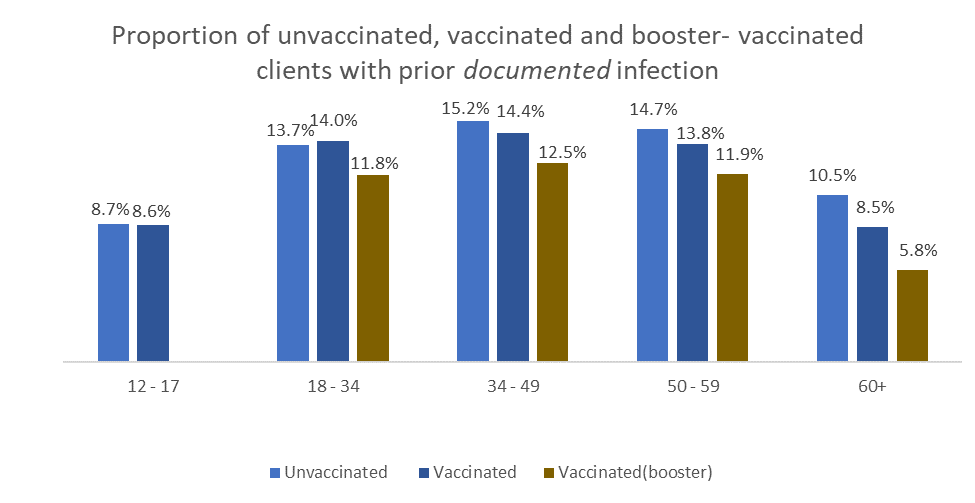
Figure 7: Proportion of members with prior infection by vaccination status and age group
(c) Are members with a higher Vitality status (who typically are more engaged in healthy behaviours) more likely to be vaccinated?
Gold and Diamond Vitality status policyholders are considered to be more engaged with positive health screening and lifestyle behaviours, whereas Blue and Bronze Vitality members are less engaged.
Based on vaccination rates as at 9 August 2022, we observe increased likelihood for individuals below age 60 on high Vitality statuses (Gold and Diamond) to be vaccinated.
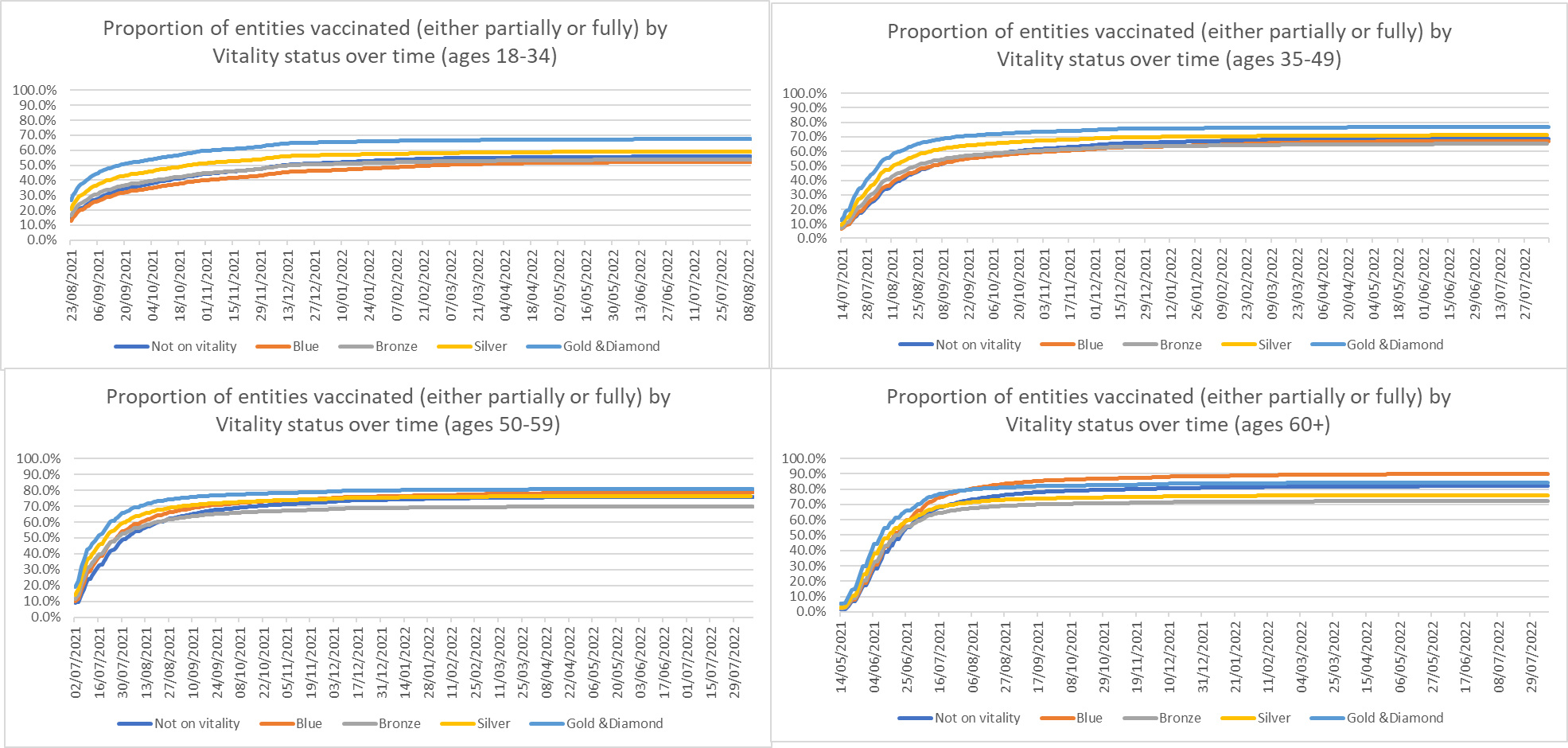
Figure 8: Proportion of members vaccinated by Vitality status
As at 9 August 2022, we see a larger increased likelihood of clients with higher vitality levels (Gold & Diamond) to have received a COVID19 vaccine booster dose regardless of age. The younger the clients, the greater the likelihood of receipt of a booster amongst those with high Vitality status vs those with lower Vitality status.
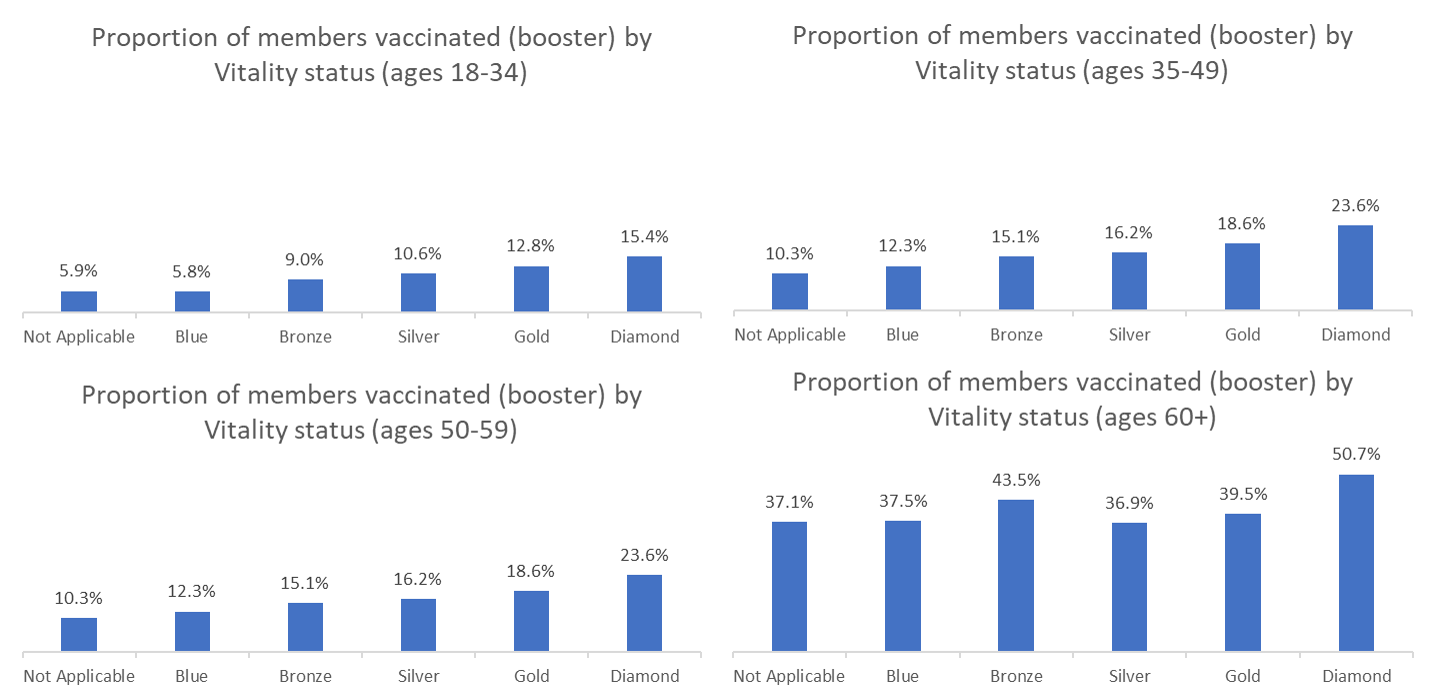
Figure 9 Proportion of members vaccinated (booster) by Vitality status
Is there any variation in vaccination rates in people over the age of 60 in various municipalities across South Africa?
Figure 10 shows the regional variation of vaccine uptake in South Africa, both within and across provinces. The analysis includes municipalities where more than 5 000 administered scheme members, who are over age 60, reside.

Figure 10: Percentage of over 60's vaccinated by municipality
There is some regional variation in vaccination rates:
In Gauteng:
- Johannesburg has the highest vaccination rate at 78.7%
- Sedibeng has the lowest vaccination rate at 64.8%
In the Western Cape:
- Overberg and Cape Town have the highest vaccination rate at 80.1%.
- West Coast has the lowest vaccination rate at 75.3%
In KwaZulu-Natal:
- Umgungundlovu has the highest vaccination rate at 80.0%
- Ugu has the lowest vaccination rate at 73.3%
Figure 11 shows the regional variation of vaccine booster uptake in South Africa, both within and across provinces. The analysis also includes municipalities where more than 5 000 administered scheme members, who are over age 60, reside.
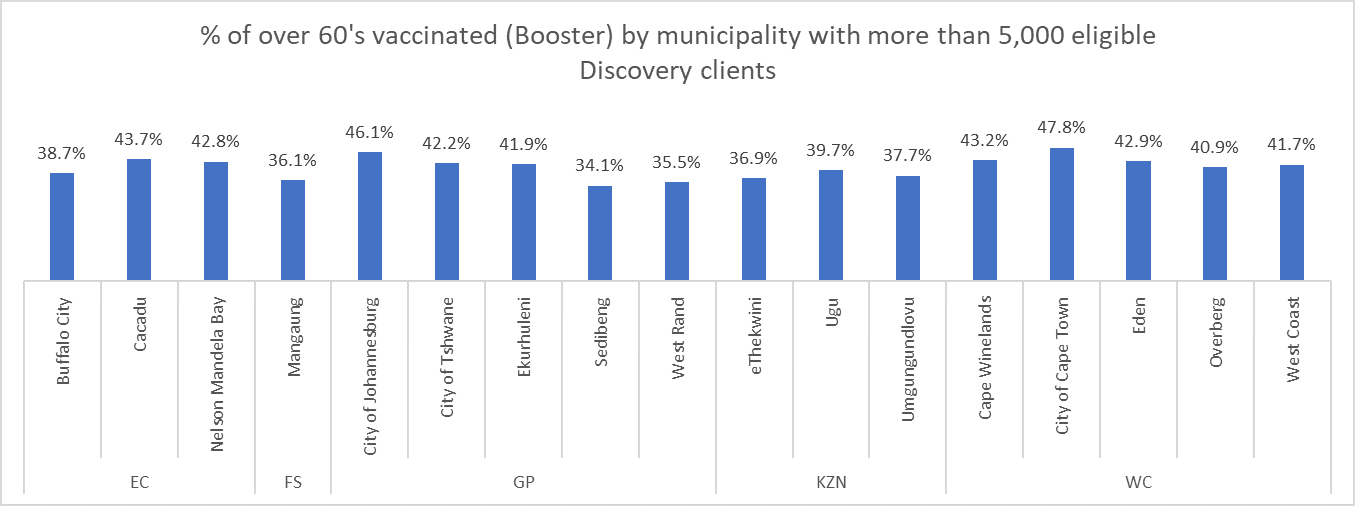
Figure 11: Percentage of over 60's vaccinated (booster) by municipality
There is some regional variation in vaccination rates:
In Gauteng:
- Johannesburg has the highest booster vaccination rate at 46.1%
- Sedibeng has the lowest booster vaccination rate at 34.1%
In the Western Cape:
- City of Cape Town has the highest booster vaccination rate at 47.8%.
- Overberg has the lowest booster vaccination rate at 40.9%
Conclusion
In summary, we observe a decline in the daily vaccination rates across all scheme member age categories since October 2021. Vaccination rates are highest for individuals age 60 years and older, with 83.6% of Discovery Health clients in the age group vaccinated and lowest for individuals aged 12-17, with 32.4% of clients in this age group vaccinated.
Booster vaccination rates vary from a low of 8.1% amongst clients aged 18-34 eligible (i.e. amongst those fully vaccinated for COVID19) for a booster dose aged 18-34 to 39.3% for clients aged 60 and above eligible for a booster dose. This indicates that individuals are less inclined to get a vaccine booster dose. In recent research, we observe significant waning in vaccine effectiveness based on duration since last dose (i.e. vaccine effectiveness reduces the longer the time elapsed since vaccination) in a period of circulation of the Omicron variant in South Africa. In the absence of vaccines with higher durability, specifically updated variant specific vaccines, frequent boosting as early as every four months may be required.
The impact of individuals personal resilience to severe COVID19 infection has a greater impact on likelihood of vaccination amongst those younger individuals aged 18-34 with low personal immunity to severe COVID 19 infection are 1.1 times likely to be vaccinated whereas the likelihood is 1.01 times for individuals aged 60 and above. This observation is also consistent amongst the likelihood of a booster vaccination across age categories with individuals ages 18-34 with low personal resilience to severe COVID 19 infections are 1.34 times likely to be vaccinated with a booster dose, whereas the likelihood is 1.03 times for individuals aged 60 and above.
We see that unvaccinated individuals are more likely to have prior documented infection across most age groups: 1.01,0.98, 1.05,1.07, and 1.23 times more likely to have documented infection relative to those vaccinated, aged 12-17, 18-34, 35-49, 50-59 and age 60+, respectively.
We see a greater association of Vitality status and vaccination likelihood for younger individuals: individuals on Gold and Diamond Vitality status were 1.28,1.16, 1.08 and 1.03, times more likely to be vaccinated relative to those on low Vitality statuses (Blue and Bronze), for age groups 12-17, 18-34, 35-49, 50-59 and age 60+, respectively. The association is more pronounced amongst younger booster-eligible individuals receiving booster doses with individuals on Gold and Diamond Vitality status were 2.06,1.63, 1.26, and 1.18 times more likely to have had a booster vaccination relative to those on low Vitality statuses (Blue and Bronze), for age groups 18-34, 35-49, 50-59 and age 60+, respectively.
We observe some regional variation in vaccination rates amongst our client base. Clients in Sedibeng are least likely to be vaccinated (64.8%) whilst clients in the City of Cape Town and the Overberg are most likely to be vaccinated (80.1%). This pattern is fairly consistent for booster vaccination rates.
There are likely many factors influencing the decision and motivation for individuals to vaccinate against COVID19 and also to subsequently receive a booster dose. Whilst increased likelihood of vaccination with a booster is associated with age, Vitality engagement, and somewhat associated with personal resilience to severe COVID19 infection and prior documented infection, there are clearly many other determinants influencing our clients' decision on booster vaccinations.
There may be several factors contributing to the observed regional variation in vaccination rates, including but not limited to, access, rate of prior infection, and vaccine hesitancy levels. The plethora of misinformation in relation to COVID-19 disease and vaccines has caused great confusion in the public mind about how best to protect oneself from exposure to the disease and how to approach vaccination.
Likely, the decline in daily vaccination trends seen across all age groups in the Discovery Health administered scheme member base is linked to the general COVID-19 vaccine hesitancy phenomenon.
In this case, many people who are pro-vaccines, in general, may be hesitant when it comes to COVID-19 vaccines. They seek answers to questions about vaccine effectiveness and safety (risk of serious side-effects) and more along these lines.
At Discovery Health we are doing all we can to empower people with facts about COVID-19 and vaccines. We do this through our COVID-19 hub, COVID-19 vaccine hub, public-facing webinars, media communications and more. We will continue our efforts to support administered scheme members in making informed decisions around being vaccinated for COVID-19. We will also continue to support the national mass vaccination rollout through our Discovery-run vaccination sites and other related efforts, in partnership with provincial and national Departments of Health.
Disclaimer
All information shared on this page is based on perspectives gained from analysing data acquired by Discovery Ltd and its various affiliate entities (Discovery). The analysis, which is conducted by Discovery's actuarial and data science team, aims to encourage industry dialogue. Publications containing our analyses are shared for educational and informational purposes only. Each publication reflects only the data available for analysis at the time of publication. It does not, unless otherwise indicated, constitute peer-reviewed, published scientific research, and hence should not be interpreted as such or used as a basis for altering treatment decisions. While every effort has been made to ensure the accuracy of the content conveyed, we cannot be held liable or responsible for any actions or decisions taken based on the information shared in this article.

New study published in British Journal of Sports Medicine: Exercise protects against serious COVID-19 outcomes
10 February 2022
Authors: Lizelle Steenkamp (Senior Healthcare Statistician at Discovery Health)

Discovery Health releases at-scale real-world analysis of Omicron outbreak; including collaboration with the SA Medical Research Council (SAMRC) to analyse vaccine effectiveness
14 December 2021
Discovery Health, South Africa's largest private health insurance administrator, releases at-scale real-world analysis of Omicron outbreak based on 211 000 COVID-19 test results in South Africa, including collaboration with the SA Medical Research Council (SAMRC) to analyse vaccine effectiveness.
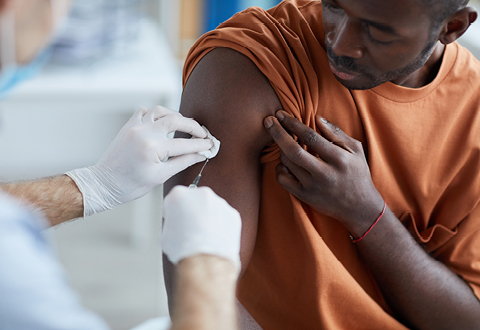
Pfizer vaccine's real-world effectiveness in protecting against COVID-19 admission and death in the Discovery Health client population
03 November 2021
Authors: Shirley Collie (Chief Healthcare Analytics Actuary, Discovery Health) and Jared Champion (Senior Actuary, Discovery Health)